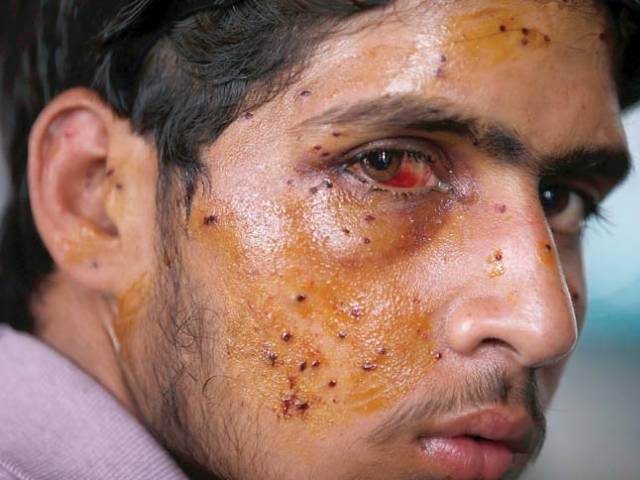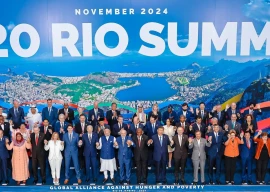
Pellet guns, introduced in 2010 to quell protests in Kashmir, have been regularly used by law enforcement agencies in the valley, leaving victims partial and, sometimes, completely blind.
Amnesty proposes ban on pellet guns in Kashmir
Usually used for hunting animals, pellet guns fire a cluster of small, round-shaped pellets, which resemble iron balls, with high velocity. A pellet gun cartridge can contain up to 500 such pellets. When the cartridge explodes, the pellets disperse in all directions.
While pellets are less lethal than bullets, they can cause serious injuries, and even loss of sight, if they hit the eye. In recent times, Indian forces have used pellet guns at close range to protect themselves from mob attacks.
 Senior BJP wants Indian courts, including the top, to refrain from delving into matters which are solely political. PHOTO: AFP/FILE
Senior BJP wants Indian courts, including the top, to refrain from delving into matters which are solely political. PHOTO: AFP/FILEBy September last year, over 3,800 people in the disputed valley had been wounded and one killed by shotgun pellets, according to official figures. Most of the cases went unreported. After a third person was killed due to pellets, human rights group Amnesty International urged India to ban the use of the potentially fatal guns.
After increasing pressure from the international community, deliberation upon the use of pellet guns in occupied-Kashmir became a tough conundrum for the Indian government.
The Bar Association of Jammu and Kashmir (J&K) recently approached the Indian Supreme Court for a ban on the use of the guns in the Himalayan region. Following a debate, the court on April 28, 2017, said that it would ask the Indian security forces and police to suspend the use of pellet guns in the valley if it is assured stone-throwing protests would stop, said the Times of India.
 Senior BJP wants Indian courts, including the top, to refrain from delving into matters which are solely political. PHOTO: REUTERS/FILE
Senior BJP wants Indian courts, including the top, to refrain from delving into matters which are solely political. PHOTO: REUTERS/FILEThe Bar Association also wanted India to hold talks with Hurriyat leaders but New Delhi has told the SC that it would not conduct talks on Kashmir with separatist leaders or those people who demand 'azadi' (freedom).
The Indian court, meanwhile, scheduled May 9 as the date for the Bar Association to talk to stakeholders and get back to it.
Now senior Bharatiya Janata Party (BJP) leader and former Union Minister of External Affairs, Yashwant Sinha, in an opinion piece on NDTV has said (Indian) courts, including the highest (Indian SC), should avoid delving into matters that are solely political.
“I do not know what prompted the Bar Association of J&K to approach the Supreme Court for a ban on the use of pellet guns in Kashmir. I am not even privy to the arguments it put forth for imposing such a ban. But if the plea of the Association came as a surprise, the observations of the court have left me completely baffled,” said Sinha in an NDTV report.
Deadly injuries show why pellet guns must be banned in Kashmir
He said, “I am against the use of pellet guns in Kashmir. The government feels concerned too, hence the search for its replacement. But whether pellet guns should be used or not in a given situation is for the government and the law and order authorities to decide, not the Supreme Court. Perhaps, it should not have entertained the petition in the first place.”
The BJP senior leader stressed that the advice of the court to the Bar Association was also surprising.
The Indian SC told the Bar Association to tell the Kashmir youth not to throw stones and assured that if stone-pelting stopped, the court would order the government not to use pellet guns for at least two weeks on an experimental basis.
“Why on earth would the security forces resort to the use of pellet guns if stone-pelting stops? They do not need a Supreme Court order for this!” he claimed, referring to the court’s directions.
The underlying question of why the stone-pelting started in the first place, however, was not addressed.
Sinha said India’s Attorney General account that “the (Indian) government would come to the negotiating table only if legally recognised stakeholders participate in the dialogue and not with the separatist elements who rake up the issue of accession or azadi in Kashmir,” also received the promises made on the agenda for alliance of the Peoples Democratic Party (PDP)-BJP government in Kashmir.
 Senior BJP wants Indian courts, including the top, to refrain from delving into matters which are solely political. PHOTO: FILE
Senior BJP wants Indian courts, including the top, to refrain from delving into matters which are solely political. PHOTO: FILEIn 2016, Interior Minister Rajnath Singh said his government was planning to set up a panel to look for an alternative to the pellet gun in reply to questions about the surge of violence in the region.
Kashmir, claimed in full but ruled in part by India and Pakistan, has been at the heart of nearly seven decades of hostility between the neighbours. Thousands of stone-pelting Kashmiris take to the streets almost every day in the protest, led largely by young people without an obvious leader, complicating Indian efforts to tackle them.
Recently, former chief minister of IOK Omar Abdullah said the situation in Kashmir would only improve when the centre recognised the problem and tried to address it.
“Today, both the state and the central governments are turning a blind eye to the situation. If you don’t recognise the anger, if you don’t address the root cause of this anger, how will the anger die? That’s why we are telling the Centre, ‘Please recognise (that) there is a problem,” he said.

















COMMENTS (3)
Comments are moderated and generally will be posted if they are on-topic and not abusive.
For more information, please see our Comments FAQ